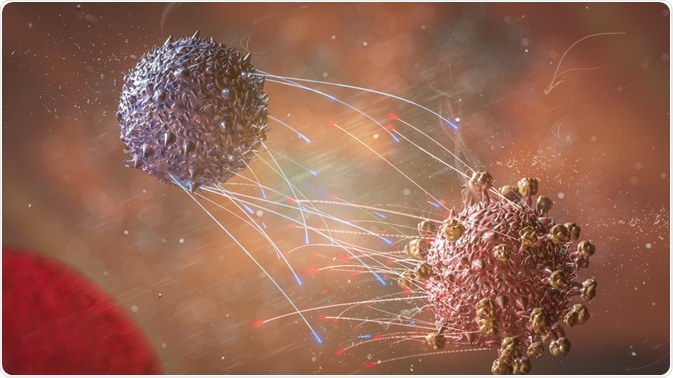Severe acute respiratory syndrome coronavirus 2 (SARS-CoV-2) has been associated with a number of comorbidities, including obesity. Obesity itself is liked to a number of problems that are independent comorbidities, including diabetes, cardiovascular diseases, hypertension, fatty liver, and respiratory disease.
Adipose tissue and T cells
Obese individuals carry a large quantity of body fat, which consists of adipose tissue. Adipose tissue can be broken down into three types: white, brown, and beige. White adipose tissue, by far the most common in humans, stores energy in the form of triglycerides and performs various hormonal functions.
Studies in mice have shown that those with more white adipose tissue store more specific memory T lymphocytes in this tissue following viral challenge, meaning that secondary bouts of infection lead to an exacerbated immune response resulting in lower survival.
 Conceptual image of a T-cell attacking the SARS-CoV-2 virus. Image Credit: CI Photos / Shutterstock.com
Conceptual image of a T-cell attacking the SARS-CoV-2 virus. Image Credit: CI Photos / Shutterstock.com
Cytokines and the organs
Additionally, many cytokines associated with chronic low-level inflammation are upregulated in obesity: IL-1, IL-6, and TNF-α, among others. Similarly, serious SARS-CoV-2 infection is associated with a massive upregulation in cytokine production, which combined can lead to excessive inflammation throughout the major organs.
There has been a major correlation between BMI and the need for mechanical intervention in hospitals in COVID-19 cases. One of the strongest driving factors in the observed higher death rates among obese individuals is the fact that obesity is associated with poor lung function in general, and as the lungs are frequently the most critically injured organ in serious COVID-19 cases these patients require intubation far more often.
Diet and SARS-CoV-2 risk factors
SARS-CoV-2 enters host cells by interaction with the ACE2 receptor, and so an abundance of ACE2 receptors on one particular organ can encourage the virus to target those cells. Generally, ACE2 receptors are found throughout the body but particularly in the lungs, gut, and brain.
Obese individuals are more likely to consume processed foods that are lacking in micronutrients and protein while being high in fats, salts, and sugars. Interestingly, high sodium consumption has been associated with reduced ACE2 expressed in the kidneys due to oxidative stress, which has in some cases been linked with more severe COVID-19 symptoms.
A low-protein diet, similarly, has been linked to lessened ACE2 expression in the lungs and gut, where it aids in intestinal amino acid homeostasis and in the production of antimicrobial peptides. It is still a matter of debate in the medical community whether careful and selective downregulation of ACE2 to particular tissues may improve patient prognosis by directing the virus to less vulnerable areas of the body, though in any case nutrient deficiencies always produce sub-optimal biomechanics.
A low protein and micro-nutrient diet has been strongly associated with an impaired immune and anti-inflammatory response generally. For example, zinc deficiency causes a decrease in serum IgA, while vitamin C deficiency is associated with lessened interferon production, both essential to the immune response to viruses.
Serious SARS-CoV-2 cases are frequently the result of extreme inflammation induced by one’s own immune system. Vitamin D has been found to lessen the severity of an inflammatory response, aiding to avoid damage to the lungs that often lead to death.
 Conceptual image of the SARS-CoV-2 virus binding to an ACE2 receptor on a human cell. Image Credit: Kateryna Kon / Shutterstock.com
Conceptual image of the SARS-CoV-2 virus binding to an ACE2 receptor on a human cell. Image Credit: Kateryna Kon / Shutterstock.com
Immunity and the microbiome
Gut microbiota is also strongly affected by the diet of an individual, and microbiota collected from obese individuals has been shown to influence host immunity by several mechanisms. Many pro-inflammatory and anti-inflammatory cytokines are produced by the microbiome, and poor gut biome health is heavily associated with heart disease.
The lung microbiome is also affected by the diet and indirectly by the population of the gut microbiome, and a poor lung microbiome is similarly associated with a lessened ability to fight off respiratory infection.
Conclusion
In conclusion, obese individuals are observed to have both a greater infection rate and a higher mortality rate in cases of severe COVID-19 compared to lean individuals. Aside from being a comorbidity itself, obesity directly induces a number of other comorbidities that heighten the risk of infection and severe symptoms developing, largely through deficiencies in the immune response of the body and microbiota.
Some speculation regarding the possibility that vaccines could be less effective for obese individuals due to their impaired immune response exist, as has been demonstrated to be the case for vaccines against hepatitis A and B, rabies, and tetanus, though this has not been established to be the case for any of the currently circulating COVID-19 vaccines.
References
- Silhol, F., Sarlon, G., Deharo, J. & Vaisse, B. (2020) Downregulation of ACE2 induces overstimulation of the renin–angiotensin system in COVID-19: should we block the renin–angiotensin system? Hypertension Research, 43. https://www.nature.com/articles/s41440-020-0476-3
- Alberca, R. W. et al. (2020) Obesity as a risk factor for COVID-19: an overview. Critical Reviews in Food Science and Nutrition.https://www.tandfonline.com/doi/full/10.1080/10408398.2020.1775546
- Popkin, B. M. et al. (2020) Individuals with obesity and COVID‐19: A global perspective on the epidemiology and biological relationships. Obesity Reviews, 21(11). https://onlinelibrary.wiley.com/doi/10.1111/obr.13128
Further Reading
Last Updated: Jan 21, 2021